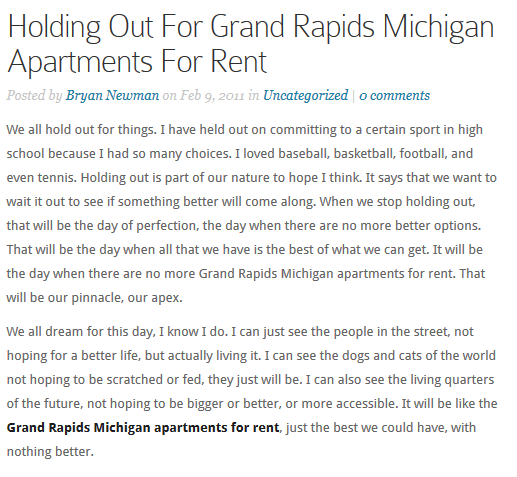Matt Cutts, the head of Google’s Webspam team and a popular blogger, recently published an article detailing what he calls the “decay and fall of guest blogging.” But for those of you who have used guest contributors before, don’t start running for the hills just yet.
In the world of Google, quality always wins. Websites, bloggers, and marketers who practice “quality over quantity” should be happy about this recent announcement from Cutts, because he really isn’t saying anything new. In the article, Cutts condemns the shady tactics and strategies that have plagued the Internet since its inception, namely: spam and low-quality content. He warns that guest bloggers who use this approach will be penalized by Google. Luckily, though, guest blogging isn’t all bad.
The Good
Guest blogging began as an honest and effective tool to increase exposure, build brands, and cultivate online communities. To do this successfully, publishers must adhere to standards of quality from their contributors. For honest marketers today, this pattern hasn’t changed.
The principal practices that set apart the “good guys” from the “bad guys” of guest blogging include:
- Contacts with publishers are made individually with the goal of building relationships and reaping mutual benefits.
- Guest content adheres to standards of quality, relevance, and community engagement.
- Any links included in the content add value and connect to relevant sources.
Here is a good example of a guest post published by Forbes, entitled “The Top 5 SEO and Online Marketing Trends for 2014”:

You will notice that the content is well-written, includes numerous sources, statistics, and relevant citations, and provides quality information that is on topic. Any site would benefit from a guest post like this. Not only will the article’s high-quality content add value to the publisher, but it will attract new readers and increase exposure for the contributor. A win-win for everyone.
The Bad
Unfortunately, not all guest bloggers follow this good pattern. Many marketers today have turned guest blogging into a link-building strategy, paying sites to include irrelevant or low-quality links in their published contributions.
In most cases, low-quality guest blogging involves the following tactics:
- Mass spam emails targeting publishers.
- Requests accompanied by promises of payment in exchange for links.
- Low quality sites targeted in an effort to achieve quantity over quality.
- Low quality, “spun” content that offers little value to the blog and is not socially engaging.
Below is a prime example of the kind of guest blogging Matt Cutts condemns:

This two-paragraph article, doesn’t provide useful facts, sources, or information that offers added value to the reader (or the website). The only thing included is bolded text pointing to the keyword phrase. With no additional value to the readers, this content is spam, and the very reason Matt Cutts warns sites against guest blogging.
Boostability Offsite Content Marketing
Luckily, as Cutts admits, there are still “some fantastic, high-quality guest bloggers out there.” Boostability’s offsite content marketing distinguishes itself from the poor guest blogging tactics employed by spammers by providing content for publishers that is both high-quality and specifically tailored to the host site. Unlike the guest blogging strategies condemned by Cutts, Boostability’s offsite content marketing processes focus on quality and user engagement:
- Content publishers are selected and approached individually, based on the quality of their site, the relevance of their content to the client, and the potential for mutual advantage (i.e. exposure, branding, and community).
- Content is published based on merit. No payment or otherwise financial incentive occurs.
- Publisher sites must be categorically focused.
- Each article is uniquely written after contact is made with the publisher to ensure the content is specifically catered to the website and its audience.
- Any and all links in the content of the published posts connect to quality, relevant, and/or useful sources.
- The primary purpose of offsite content is user engagement, not backlinks.
Keeping in line with the original goals of early guest blogging, Boostability aims to add quality and value to the Internet through well-written content that benefits all parties involved: the publisher, the readers, and the clients.
Cutts shook up the blogging world this week with his vendetta against guest blogging. But this isn’t necessarily a bad thing. As more and more websites become aware of the problems he addresses and learn to identify mass spammers, those who have played by the rules all along will reap the benefits—and for those who haven’t, perhaps this will be a much-needed wakeup call.
